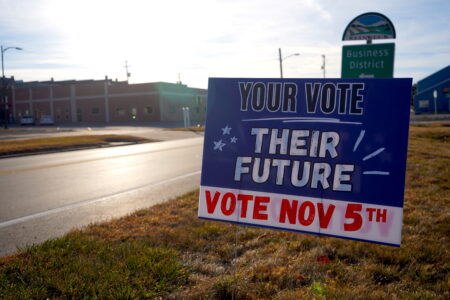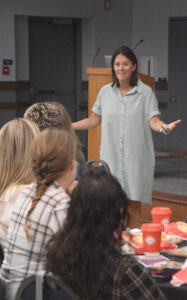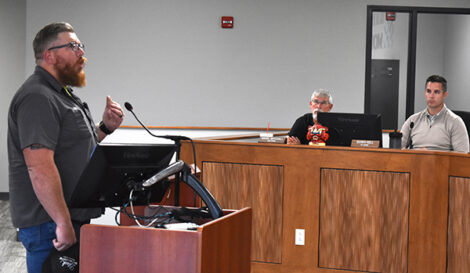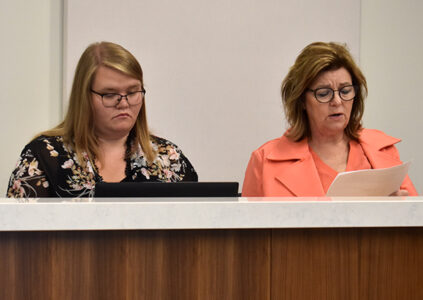‘Employees don’t leave employers. They leave leaders’
Speaker Ali Payne addresses generational differences during ‘Workforce Wake-Up’ event at MCC Wednesday
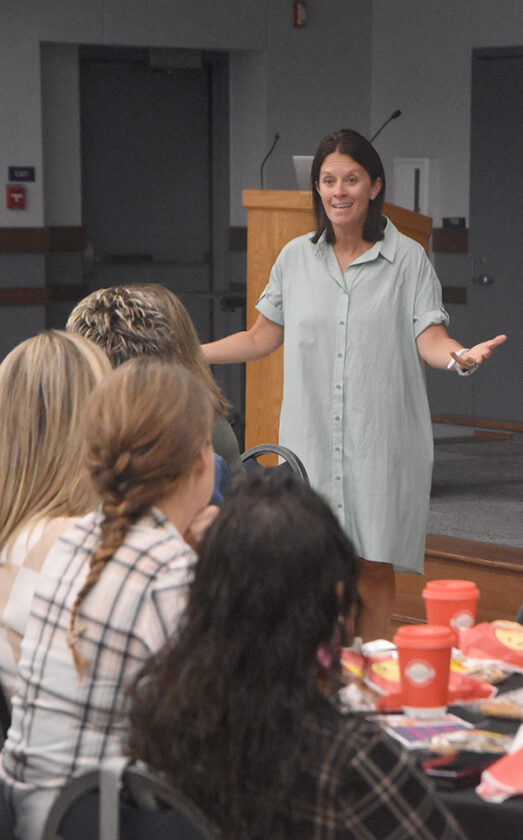
T-R PHOTO BY LANA BRADSTREAM Ali Payne, senior partner at The People Co., explains differences in how generations communicate to attendees of the Marshalltown Area Chamber of Commerce Workforce Wake Up on the Marshalltown Community College campus Wednesday morning. Almost 50 people attended the informational session.
Different generations bring different dynamics into the workspace. During the first Marshalltown Area Chamber of Commerce Workforce Wake Up on Wednesday morning, almost 50 attendees received information on how to bridge generational gaps. With four generations in the workforce – Boomers, Gen X, Millennials and Gen Z – understanding the differences will help create a more enjoyable work environment.
The People Co. Senior Partner Ali Payne spoke about a variety of aspects, such as mental health, technology impact and more. She started the session by asking the crowd to identify some general characteristics of the four generations. For example, Boomers (people born from 1946 to 1964) value loyalty; Gen X (those born from 1965 to 1980) prioritize work-life balance; Millennials (born from 1981 to 1996) tend to be purpose-driven and; Gen Z (born from 1997 to 2012) are socially conscious.
“The generations are very, very interesting, and when you think about each of them, they’re all right in their own way,” Payne said. “They all bring this amazing value to you as organizations, if you know how to harness that value.”
The problem is there are not a lot of tools, other than books, on how to connect with other generations. The challenge is figuring out how to make everyone in a business or organization prepared to work with other generations.
“They all like to be communicated with differently,” Payne said. “They all like to be taught different things.”
She asked attendees how many of them had a trainer walk them through how to do everything on their job on the first day. Unfortunately, Payne said many times employers believe the person hired will know exactly what to do – sometimes that works out and sometimes it doesn’t.
“Most of us started a job and someone walked us through what to do,” Payne said. “We viewed our leader as someone who would help us in our career. Every generation has changed a little bit, but the Gen Z generation don’t need you as a leader to teach them how to do something. Why? They go to YouTube. They go to TikTok. They ChatGPT it. They’re not looking to you to teach them how to do something. They’re looking to you to be a coach, to help them get their next role.”
Other aspects of Gen Z that are different include the facts that they generally do not want to stay in the workforce, will not wait around for instruction and are not afraid to ask for more money or paid-time-off.
Another thing Payne said is known is the view of the future has been skewed by the generations.
“What’s happening politically has either made it really bad or really good for some people,” she said. “You’re dealing with that as an employer.”
Thus, people want to work for employers which give them a purpose and have a firm purpose beyond profit, such as Patagonia – an outdoor recreation retailer which donates 1 percent of total sales to environmental groups. According to Payne, Patagonia receives 12,000 resumes each month.
“People want to know they work for an organization that has meaning,” she said. “Gen Z and Millennials will have the greatest wealth transfer ever to happen. So, a lot of younger employees don’t even need a job, because they know they will have this huge generational wealth transfer.”
The younger generations also want to know how the employer will develop them. A culture of daily development, with a belief and purpose and leaders display those, the younger generations will apply and stay.
“You should not rely on development to happen,” she said. “You should be part of it or you should be open to developing every single day.”
Identifying and leveraging generational strengths is valuable for an employer to learn. Some strengths generations bring include mentorship from Boomers; problem-solving by Gen X; diversity, Millennials and; social responsibility, Gen Z.
“Boomers have experience and would be amazing mentors,” Payne said. “The knowledge in their brains is crazy. Figure out how to harness that knowledge and get it to the younger generation.”
She expanded on the diversity strength of Millennials, and added it goes beyond race. If an organization only has golf tournaments for events, that is a problem, Payne said. Some employees might not enjoy golf. For Gen Z’s social responsibility, she said most organizations give back to communities in some way and should celebrate that. Payne suggested sending out a social responsibility report, even if it is only one page.
“Do your people volunteer? Do they give back to the community?” she asked. “Do you make it available for them to give back to their community? Ask them how many hours they volunteered this week. . . . The younger generation will probably ask you about it.”
That activity of the organization and the attitudes and beliefs of leaders will be sought for by Gen Z, and the company website will be the last online location they go. Rather, Gen Z will look at social media platforms or websites such as Glassdoor in order to get a better understanding of the business they might apply at.
“Employees don’t leave employers, they leave leaders,” Payne said.
——-
Contact Lana Bradstream at 641-753-6611 ext. 210 or lbradstream@timesrepublican.com.

